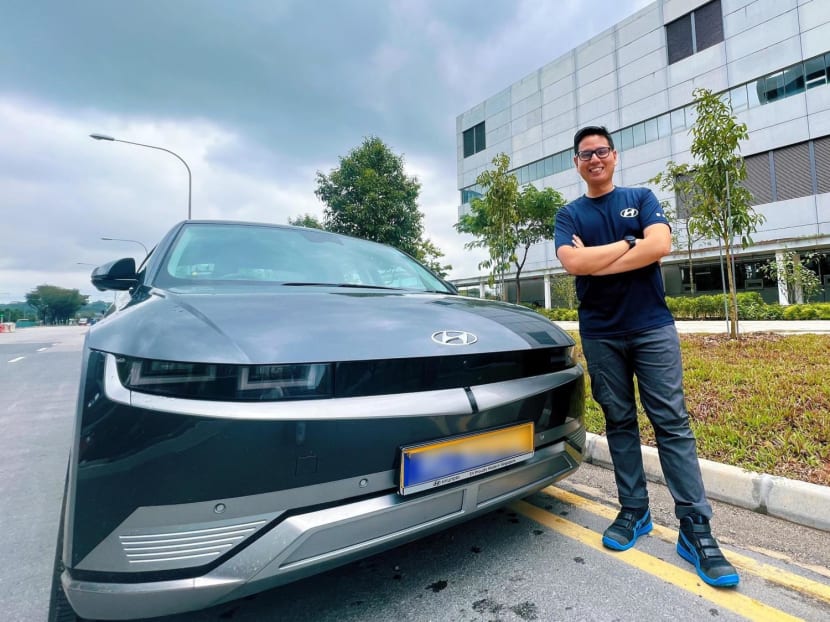No Degree Required: I discovered my talent for engineering at ITE. Now, I build electric vehicles with robots

Mr Muhammad Aliff Adha, 33, is a production supervisor at Hyundai Motor Group Innovation Center Singapore.
When I tell people I work at Hyundai, they assume that I work in a car workshop. But after explaining that I assemble electric vehicles (EVs) using robots in a smart factory, their interest is piqued.
I’m proud to say that I’m part of the Korean company’s only EV manufacturing team in Singapore.
I wouldn’t be where I am today, if not for my parents’ advice and a supportive learning environment.
When I was in secondary school, I was disappointed when my N-Level results weren’t good enough for me to progress to Secondary 5.
My only option then was the Institute of Technical Education (ITE). I wasn’t keen, but with my parents’ advice, I applied for an engineering course at the former Bukit Batok campus in 2007.
I had difficulty adapting to ITE initially. Thankfully, my lecturers were very patient, guiding me in my lessons and believing that I can do well in my studies.
I soon found out that I enjoyed engineering and hands-on learning.
I graduated from my Nitec in Precision Engineering (Machining) in 2009 with a perfect grade point average, and was offered an Economic Development Board (EDB) Scholarship to join the Technical Engineer Diploma (TED) in Machine Technology at ITE. I accepted without hesitation.
Though the TED course was more theoretical, the lecturers were very supportive and worked tirelessly to ensure that I understood what was being taught. This motivated me to do my best.
In 2011, I topped my TED cohort and received a Gold Course Medal.
My career journey started in 2014 soon after I completed my National Service.
I found out that jet engine-maker Rolls-Royce Singapore was willing to accept fresh graduates from ITE. I applied and was accepted in January 2014. I started out as an assembly technician for commercial aircraft engines.
Then, the Covid-19 pandemic hit. The aviation sector was badly affected, and I was retrenched in August 2021, after 7.5 years. That was the lowest point of my career.
Fortunately, just before the retrenchment exercise, my TED lecturer contacted me and told me there was a career opportunity in Hyundai. I jumped at the chance and was given the role as a senior assembly technician in September 2021.
As part of the pioneer batch, I was sent to Daegu, South Korea for three months of training. There, I learnt how to assemble EVs.
Being in a smart factory was mind-blowing. I had to work alongside robots and use smart technologies such as artificial intelligence and the internet of things.
Working with robots is not as straightforward as one might think. I have to ensure that these high-tech machines are working well during production and that all parts are delivered on time to each step on the assembly line.
This was quite challenging for me at first as I was used to manual work from my previous job.
I had to ensure that I was familiar enough with the robots so I could figure out what the issue was when an error occurred. Then I would rectify it, move the robot to its starting position and restart the process. I also needed to do this quickly enough to minimise delays.
Thankfully, Hyundai provided me with intensive training on how to do basic troubleshooting.
Once I got the hang of it, I enjoyed and appreciated the integration of technology in the assembly process.
It excites me every time I see how the robots assemble cars. It feels like I’m stepping into a different world! Instead of humans, we have robots moving car components around and assembling them. This greatly reduces our workload and improves productivity.
Once completed, these newly assembled cars can be test-driven at the 620m-long track located on the rooftop.
After 1.5 years, I was promoted to production supervisor. My duties now include ensuring that the production line runs smoothly and manpower planning.
I am learning new things every day, and in future I hope to leverage my technical skills to come up with ideas on new technologies, improve existing ones and drive innovation.
No doubt, robots can perform certain tasks better than humans, but tasks that require critical thinking and interpersonal skills will always require a human touch.
ABOUT THE WRITER:
Muhammad Aliff Adha, 33, is a production supervisor at Hyundai Motor Group Innovation Center Singapore. He has nearly 10 years of manufacturing experience in both the aviation and automotive industries.
If you have an experience to share or know someone who wishes to contribute to this series, write to voices [at] mediacorp.com.sg (voices[at]mediacorp[dot]com[dot]sg) with your full name, address and phone number.






